From Merv to Serakhs
In the morning, after breakfast with my roommates, I set out to find a taxi to the border at Serakhs. I probably could have squeezed in a visit to the regional museum (which is supposed to be quite good), but share taxis typically leave in the morning and I wanted to make sure I would be able to make it all the way to Mashhad that day. The taxi lot is basically the parking lot in front of the train station, near the bus station, and I was able to find a driver without too much difficulty—we just had to wait for additional passengers.I'm something of a Coke addict, so while waiting I bought some samsas from the food vendors next to the station, and also picked up a bottle of Coke. This is a bit of a weird purchase, especially since I was low on manat, but I wasn't sure if Coke, as a western brand, would be available in long-isolated Iran (it turns out I shouldn't have worried, as both Coke and Pepsi have continued to exist since their introduction, likely before the revolution).
Although Mary doesn't look to be that far from Serakhs, don't discount how much farther things seem when the roads are horrible. Although even the main roads in Turkmenistan are surprisingly bad for a petrol country, the side roads are even worse, with lots of potholes that result in cars weaving from side to side to dodge them. Most of the ride to Serakhs was on exactly these kind of roads, and it took about three hours to get to Serakhs. We were dropped off a short distance from the immigration post, as there was a huge queue of trucks and cars lined up before the border.
Crossing the border
Leaving Turkmenistan was relatively painless, aside from again-mandatory border shuttle that we had to take, for the extortionate sum of $2, for a road that is about 1.5 kilometers long.On the Iranian side, things were considerably more complicated, and there a huge number of people in the waiting area. I'm not quite sure how things are supposed to work, but you give your passport to someone, then take a seat in a large waiting area. And then you wait. And wait. And then you'll be summoned, asked a few questions, and then told to sit and wait some more. One of the customs officers—an older, stern looking guy with a grey mustache—talked to himself in Farsi while he looked at my documents, then beamed at me and said "I love you!" before he resumed muttering to himself. I think it might have been the only thing he knew how to say in English, and the contrast between his otherwise grim demeanor and the warmth with which he said it was amusing. He then gestured that I should go sit down again.
I was eventually summoned into a commander's office, where I answered some questions and was stamped in shortly thereafter—it appears he was out or busy before then, and for some reason I needed to speak with him. In any event, it actually took significantly longer to process me than it did to process locals, and I suspect that if you entered at a busier border that is more accustomed to foreigners things would be substantially easier.
The Iranian side of the border compound is pretty big, with lots of various buildings and inspection points—much more organized and professional than the rather perfunctory border posts of Central Asian countries. One of the interesting things I noticed was a large steel water reservoir with spigots and on each side, as a kind of public water fountain, with one side for women and another for men. Once I made it outside the border area, I stopped by the gate and fired up my netbook. I had downloaded an old version of the Lonely Planet Iran (this was the first country for which I didn't have a hard copy of LP), and hoped to find some useful information on how to get to Mashhad, but it honestly wasn't of much help.
Arriving overland usually makes the transition between countries and places much smoother, but in all honestly the difference between Turkmenistan and Iran was even greater than the difference between China and Kyrgyzstan (going between the CIS 'stans is relatively easy in comparison)—or perhaps it is more accurate to say that the differences made it more challenging. In Iran everything looks different. There is no Soviet-style architecture but a lot of narrow, low-rise concrete storefronts with glass windows running the width of them; no Cyrillic, and little Latin, but lots of Arabic script; the people look different, with lots of facial hair for men and hijabs for women; and decent infrastructure with French cars.
I was to quickly learn that Iranian drivers are crazy, but this wasn't immediately apparent as Serakhs seemed strangely dead when I headed into the city, and I wasn't sure where I should change money. Of course, the fact that most signs were in Arabic script didn't help matters. I wandered around the city for a while, hoping to find a bus station (or a friendly local to offer to help), but no such luck (this is likely because, as I later learned, I pass as Iranian—if you look white or western you'll have no problem attracting copious attention and inquiries), so I walked back towards the border point. Although I hadn't seen an share taxis nearby, I figured that they must congregate somewhere nearby. It turns out that I was correct, as there is a gas station along the main road to Mashhad, across from the park that separates the border point from the city, and cars to Mashhad congregate at the roadside there.
As in Turkmenistan and Uzbekistan, Iran subsidizes gasoline. Not to the extreme extent that Turkmenistan did, but it is still very cheap, which has a salutary effect on transportation prices (as did the massive devaluation of the rial that occurred in early 2012—it dropped from about 1,000 rial to the US dollar to about 3,000 to the USD, largely as a result of increased economic sanctions). I had little idea how much it should cost to get to Mashhad, but I was able to get there for the paltry sum of $3. Again, it helped that the driver wasn't a professional driver but just a private individual going to Mashhad and looking to defray costs, and it may have helped that I had to pay in dollars and they seemed unsure of what exchange rate to apply.
From Serakhs to Mashhad
The drive to Mashhad is actually pretty picturesque, in a desolate kind of way. There's one ridge of mountains that separates Serakhs from Mashhad (the same range that is south of Ashgabat), with the terrain east of the mountains being dry and desertified, while to the west the slopes are greener. The road also passes by the Serakhs train station, which is actually a fair distance outside of town and not that useful for passengers since you'll basically need a taxi to get there, anyway.Anyway, the ride into Mashhad was my introduction to Iranian traffic and Iranian drivers (both of which explain why many of the cars you see there are beat up and scruffy). If there are three lanes marked on a road, people will drive five abreast. Sometimes when you see scrazy traffic patterns in places like Vietnam, it's almost like watching flocks of birds where there is some sort of underlying logic or harmony that underpins the strange patterns you see. In Iran, there is no such logic, but true chaos and a perpetual state of near misses. We were dropped off where the highway to Serakhs intersects with the Ghadir expressway which skirts the eastern edge of town, but I had no idea where exactly we were. I also had no rial, and no maps other than what was on my netbook. I knew we were obviously on the eastern side of the city, so I started to walk into town. Thankfully, after an hour of walking (by which time it was dark), I came across street signs that were in Latin script and which also pointed the way to the Imam Reza shrine, which helped me figure out where I was. It took over two hours to walk the ten-plus kilometers to Vali's homestay, which is rather famous as the place to stay in Mashhad. Of course, it's basically the only place to stay in Iran that is set up to handle foreigners (most of Mashhad's tourism is domestic, as the Imam Reza shrine is of incredible religious importance to Shiites).
The final part of actually locating Vali's was the easiest part of the whole day, and I was relieved when my knocks on his door were answered and learned he did have space for me that night. Despite it being the middle of November, his place was still pretty busy, with all the proper beds taken, meaning I had to sleep on a kurpacha-style mattress on the floor. No matter.
All about Vali and his homestay
For the most part, Vali and his homestay enjoys a very good reputation with both travelers and Lonely Planet, and it's easy to see why: Vali is a very charismatic and interesting guy who knows a lot about the area and is very helpful; he knows what budget travelers like, and he caters to their needs and desires quite well; he can help with tickets and arranging Turkmen visas for travelers heading east; he even stocks and sells Lonely Planets for travelers coming from Turkmenistan; his wife is a great cook and dinners there are great; he's also a carpet merchant so he can tell you about carpets and sell them to you, too, letting you pay his brother in Vancouver (if you order while out of the country) and then shipping them to you.But despite everything Vali offers, I think that there are also a lot of people who grow skeptical of him and what he offers. After spending only a couple of nights at his place, I don't think it's unfair to say that Vali is an extremely shrewd businessman who understand that the best way to part people from their money is by earning their trust, and that on a personal level he contains the worst aspects of Iranian chauvinism that may make women, especially, feel uncomfortable and even unsafe around him. but lets look at how these things play out, and why I have this opinion of him.
The accommodation is basic
For one thing, lets start with the actual accommodation. He was charging $6—or 18,000 rial—for a bed in his dorm room, which was basically his basement/garage (his car was parked on a concrete ramp leading down to the basement level). A couple of rooms and a bathroom had been walled off with thin aluminum and glass dividers. Now, this didn't create a lot of acoustic or olfactory privacy for the bathroom, which had a small chamber where a squat toilet was located, and another larger are where the shower was. There's apparently another toilet just off the courtyard, where you can also pay to sleep. The common room in the basement was actually pretty atmospheric, as he stores a bunch of carpets down there. But for the most part, everything was substandard for any type of accommodation in Iran. As another hotelier who was familiar with Vali remarked, how can a place as busy as Vali'snot even make the effort of putting on a fresh coat of paint or putting in proper walls and secure doors on the "private" rooms?The prices are high (but the food is great)
Next, let's look at his prices, which may be the clearest example of Vali's approach to business. When I was there Vali made a point, after quoting people how much he charged, of saying they could check the prices in Lonely Planet to make sure he wasn't overcharging. The problem, as I alluded to above, is that Lonely Planet quotes prices in US dollars (as a hedge against high annual inflation of the rial), and the rial had massively devalued against the dollar. So when LP quotes $6 per night, they really meant that Vali was charging 6,000 or 7,000 rial per night. But Vali was using the $6 rate and converting into a devalued rial, meaning he was actually charging 18,000 rial per night (and you would pay in local currency). Vali is the only hotelier in Iran who did this, and staying at his place was no bargain. I mean, in Tehran I was able to stay in a single room with a TV and a fridge, with breakfast included (it's $2 extra at Vali's), for 25,000 rial per night. And in Kerman I stayed with two other people in a triple room that cost each of us only 9,000 per night. In Yazd, I stayed in a dorm room with an sumptuous free breakfast for 10,000 per night. Vali's makes sense at 6,000 per night, but at 18,000 per night it's highway robbery. Apparently he now charges $10 per bed in his dorm, which is absolutely insane.Even worse is his internet pricing: $1 per hour. This is simply ridiculous. At the aforementioned hotel in Tehran I paid 3,000 rial per day for wi-fi. In Yazd and in other places it was free. When I was there a Chinese girl showed up in the evening and asked about the internet, and she left because the internet price was so high, as she needed to be online a lot. Vali defended his price, saying that inflation is really high. Of course, he skipped that part about the devaluation, and neglected to say that internet prices are regulated in Iran.
Breakfast is also steep at $2. But even with the tripling in value of the dollar, dinner remains a good deal, as his wife is a great cook, and the best meals in Iran seem to be served in the home, and not at restaurants. This is a bit weird, but restaurants in Iran seem to be very fast-foodish, even if it isn't exactly western fast food that they're serving. Authentic traditional Iranian food is surprisingly difficult to find, and you're much more likely to find kebab shops, felafel and sandwich shops, and pizza and burgers. Eat at Vali's and you'll get a number of different courses of delicious food.
Vali also stocks copies of the Lonely Planet, which he was selling basically for the face value of the book. This meant about $30, and even though I knew he must have paid less than 25,000 rial for them when he bought them, and was now selling them for 90,000 rial—but pretending he was just offering this as a selfless service to his guests—I didn't have too big a problem with it since I knew I would have to pay a similar price if I wanted to buy the LP from a bookshop in the US.
Now, strange as it may seem, Vali's practice of using US-dollar pricing for all of his services actually allows him to seem trustworthy in another way: he's willing to change small amounts of money for good rates. You'll basically get the same rate as you will at a big money changer—or possibly even a bit better—as Vali knows that by offering a good rate it makes him look honest, and he's already making enough money off of his inflated dollar prices to be able to forego the few percentage points he could make on changing money.
Vali the Chauvinist
Although Vali's wife is a great cook, she's also pretty conservative and I don't think she's really comfortable with all of the foreigners she's surrounded by. Vali acknowledges this, and also acknowledges that he basically forces her to be more liberal. At any rate, she's exactly the sort of woman that the phrase "long-suffering" was invented for.Vali eats with the guests at dinner. His wife serves, and the rest of the family eats separately. During diner the first night, he asked if any of us were doctors. None were, although one person had studied health science. Close enough for Vali, who then proceeded to describe a recent, sensitive operation his wife had undergone, and ask if there was a medical reason for a change in their relationship. I mean, I don't feel good even obliquely repeating what he said on a blog that no one will ever read, but he just laid it out for everyone. I'm glad his wife doesn't speak English, or she would be mortified.
His teenage daughter, however, does speak English, and the next afternoon I was talking to Vali upstairs by the kitchen (his family lives on the upper level) when his daughter came in to do her English homework. Her English is pretty good, and she was asking some questions on stuff she was having problems with, and Vali's pedagogical approach was to tell her (in English) she was stupid and would continue to make mistakes unless she tried harder. It was really harsh and demeaning, and she understood exactly what he was saying. I felt really bad for her.
That's not really an example of his chauvinism, but I do think it says something about him. On the other hand, I have heard plenty of reports from multiple travelers about rather suspect things happening around him. Males travelers have spoken about Vali telling them about the practice of "temporary marriages" in Iran—a sort of legalized prostitution, where you temporarily marry someone so you can have sex with them, then divorce them immediately after—and boasting about the number of temporary marriages he had had; females have reported suspect comments and even the door to their private room being jiggled in the night. This sort of behavior is unfortunately fairly prevalent in Iran, based on a few blogs I've seen by female travelers.
Vali the carpet merchant, ticket booker, and visa fixer
Now, at the same dinner from the night before, Vali happened to talk a lot about carpets. But instead of talking styles or quality, he mainly spoke about all the gusts he had sold carpets to, and how many of them buy carpets based on pictures he emails them, whereupon he sends them the carpets and trusts them to pay his brother in Vancouver (payments directly to Iran being impossible because of sanctions). He also mentioned how lots of them make money by re-selling his carpets in the west.This is interesting, but in all honesty I think the number of travelers who can properly value carpets and understand their value is quite small, and I can't imagine buying carpets based on emailed photos alone. Even with my limited knowledge of carpets, I could tell that many of the carpets in his basement were of mediocre quality at best, which perhaps isn't hugely surprising given that most of Vali's carpets are repaired.
On my first full day in Iran I visited his carpet workshop, but it was perhaps even more interesting because he wasn't there, which gave me the opportunity to wander around and look at the other shops is his, and surrounding, buildings (the carpet shops are mainly in small buildings four or five storeys tall, with small interior courtyards the shops are arranged around: like small, narrow caravanserais that are five stories tall instead of just one or two. You can watch craftsmen repairing carpets, tying new knots to patch up holes, and applying paint or dye with small brushes to faded sections.
Anyway, I don't know enough about carpets to say whether his carpets were good deals or not, but I do know enough about Vali to suggest you carefully compare his prices with others before deciding whether or not to buy. Given his practice of sticking to US dollar pricing regardless of the devalued rial, and his soft-sell on how many people buy his carpets (and make money off of them!), I think there is reason to suspect his claims. I mean, why doesn't he just send his bargain carpets to his brother in Vancouver, and get him to sell them for the big prices you can apparently get for them?
Vali also offers other services for a price, from acting as a tour guide (can't comment on this, but I suspect he's probably quite informative and knowledgeable), to procuring tickets, to helping people with their Turkmen visas. On the visa front, I've heard that he doesn't really have any connections, but just facilitates things by acting as a translator and perhaps being pushy, for which he charges $20. On the ticket front, he says he can book train tickets, but in reality he pushes hard for bus tickets and claims the train is sold out. I tried to book the train on my own, but it's actually quite tough since the train station tells you to go to nearby travel agents, and the travel agents were either really busy or closed when I went. I ended up booking a bus ticket with Vali, which involved a booking fee for him... which is probably to be expected, but wasn't disclosed and was simply added to the actual ticket cost.
Vali also has a "partner" who actually seems to be a governmental minder
When I checked in to Vali's I met another Iranian guy who Vali introduced as his partner or colleague. He also spoke English, but it was never really clear what his job was or what he did. One of the other couples who was staying at Vali's went out to a shisha bar with him, and from their conversation it turned out that he actually wasn't a business partner, but was a government employee who had been sent to monitor Vali. According to him, this was because the government was concerned that he possibly wasn't paying his taxes properly and was conducting his business improperly. It's possible they were actually concerned with what he was telling foreigners, but this seems unlikely since there is very little apparent monitoring of foreigners at other establishments, and I can't imagine any government agency being happy with some of the stuff Vali says to foreigners anyway. It was a bit weird, but certainly gives the impression that Vali isn't entirely trustworthy.Okay, so how about Mashhad?
Mashhad is all about the Imam Reza shrine, which is a huge draw for Shiite religious tourists. Imam Reza was the eighth imam according to Twelver Shiites (Ismaili Shiites only agree on the first seven imams), and today his tomb is the site of a huge religious complex replete with mosques, libraries, courtyards, and, or course, his actual burial site.When I was in Mashhad it was also the beginning of the Ashura commemoration of the martyrdom of Husayn ibn Ali, which is basically ten days of ritualized mourning and self-flagellation, culminating on the tenth day with the official recognition of his death. In practice, this results in lots of people in black marching around in somber parades while banging huge drums and carrying black banners, with men often beating their chests or flagellating their own backs (the use of knives and chains to self-injure has been outlawed). It's also a time when lots of people give away free food, with wealthy people picking a day and then basically serving food on an industrial scale in takeout containers.
Coming from Central Asia, where religion is of relatively minor importance, hyper-religious Mashhad is a bit of a shock. And although it never occurred to me to think of it in these terms, many people in the west seem to think that Iran is some hotbed of anti-western sentiment and violence, but at no time did I ever think there was anything dangerous about any of this. I mean, running the gauntlet between anti-abortion protesters in front of an clinic in the US would be way more dangerous; these were just people expressing their religious beliefs.
It's also possible that part of the reason I didn't feel any danger was because I can pass as Iranian. I mean, I've passed as Kyrgyz on occassion, but I passed as Iranian everywhere in Iran, and it really wasn't possible to distinguish me from Iranian in terms of dress or hairstyle or anything, either. The first hint of this was on my first morning in Mashhad, when I went to a local money-changer to get some rial. On my way, I was stopped by an Iranian guy asking me directions to somewhere—I guess I looked like I knew where I was going. This was to become fairly common.
My ability to pass as Iranian really paid off when I visited the Imam Reza shrine, where only Iranians (or Shiites, really) are allowed inside the shrine, and where foreigners are usually rounded up at the entrance and given a guide to accompany them around. At first I was kind of resentful that I wasn't given a guide (even when I went to the information desk, they just gave me some literature, whereas everyone else at Vali's had been assigned a guide/minder with whom they were able to have interesting—if sometimes less than honest—conversations), but I was able to go pretty much everywhere. Inside the actual mausoleum there is a mad crush of people as everyone makes their circuit to Imam Reza's tomb, which is enclosed inside a cage of thick silver bars (this enclosure seems to be pretty common in Iran). Men and women are separated by glass walls and partitions, of course.
Perhaps the most interesting parts of the complex were some of the side-rooms whose walls were decorated entirely in mosaics made of tiny mirrors that reflected light unevenly, creating not mirror images but strangely sparkling rooms—almost as though the walls were made of chandeliers.
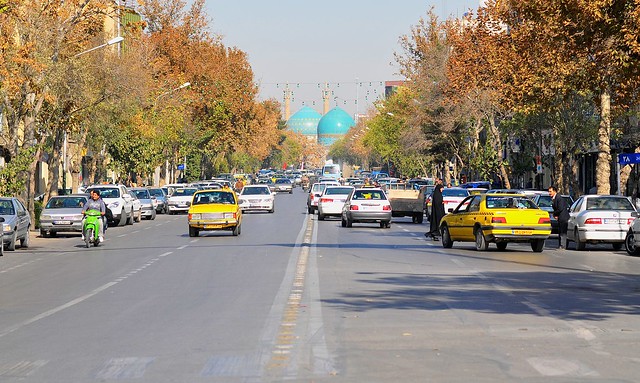 |
| On one of the roads leading to the Imam Reza shrine. |
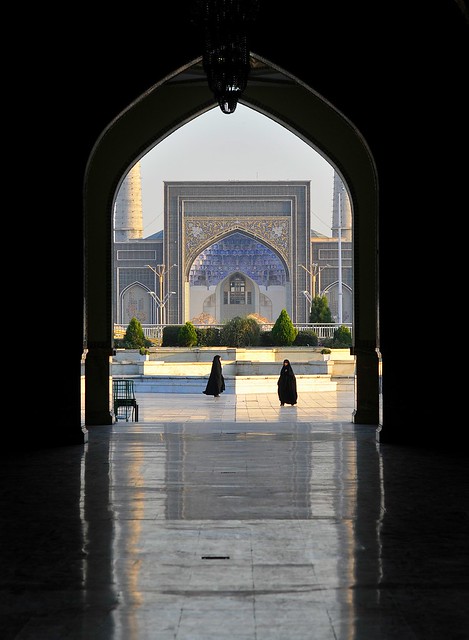 |
| Two women in the mandatory (for Imam Reza) chadors walk through one of the courtyards. |
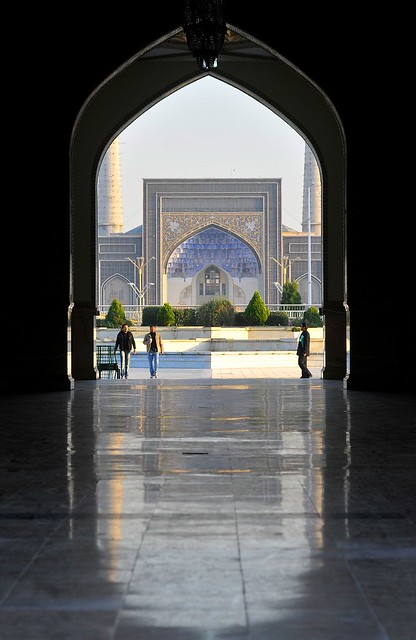 |
| The dress code for men is considerably more relaxed. |
One of the interesting things about Iran is that you see modern buildings built very much in the style of ancient buildings in Central Asia. You have huge pishtaqs with ornate mosaics and majolica, iwans with intricate muqarnas, and there's no pretense that these are old structure. This is very different than in other parts of Central Asia, where modern religious buildings are built in different styles and look decidedly new.
Other than the Imam Reza shrine, however, there's really not a lot to see or do in Mashhad. And even less if you have the most recent Lonely Planet, as by comparing the new version I purchased from Vali and the old version I had on my netbook, it was clear that they had actually deleted content from the new edition.
Anyway, after my first day in Mashhad I had decided that Vali was crazy for suggesting that I should spend at least three days in Mashhad, and I decided to join a Canadian couple who were heading south to Kerman the next day.
Buying camping gas: an introduction to taaroff
I had been traveling with a small camping stove that I had first picked up in the Philippines in 2006. It wasn't a western-style camping stove taking western gas cylinders, but a stove that takes the butane gas cylinders frequently used in small portable burners used in Japanese and Korean hot-pot style cooking. |
| My stove. Kind of bulky compared to true hiking stoves, but it fit perfectly inside my pot. |
The benefit of this kind of stove is that the gas cylinders are much more readily available in Asia, and are pretty cheap at one or two dollars. It was hard to find replacement cylinders in Central Asia, but an outdoor shop just down the block from Vali's actually had them in stock. When I went to ask how much they were, however, I got a strange reaction—a kind of a shrug of the shoulders and a gesture that I should just take it. Weird. I was confused, but again asked how much it was. Only after doing this a couple of times did the clerk sell me the cylinder.
This was my unwitting introduction to taarof, which is a sort of ritualized politeness that Iranians take to another level. I mean, we all lie about how cute someone's ugly baby is, or tell people to call us when we have no intention of ever speaking to them, and many Europeans feel deceived by the fake friendliness of Americans, but in Iran it's practically an art. In Iran politeness requires Iranians to offer just about everything, but since everyone knows that offers are often made out of politeness, it's polite to refuse an offer. So clerks will tell customers that they don't have to pay, and customers will insist on paying. Invitations to dinner will be made, and decorum requires that those invitation be refused. It's only when an offer is made even after three refusals that you may accept the offer without being impolite. But even Iranians get tripped up sometimes, especially when an offer is made by someone you are friends with, but whom is not making a sincere offer at that particular time. For the most part young children (those that we, in the west, might expect to believe in Santa Claus) and foreigners are not expected to know or follow taarof, but it's such an internalized and common part of Iranian society that there's no doubt tourists will encounter taarof, and accept invitations even when not meant. But on the other hand, Iranians really are incredibly hospitable—especially to westerners—so the offers an invitations will usually be sincere.
The bus to Kerman
Like China, Iran has lots of people and pretty good infrastructure, which means that they have good, scheduled transportation options. And while Iran does have a decent train network, it's nowhere as comprehensive as China's and it can also be challenging to get tickets, so buses are the biggest mode of transport. And while Iran doesn't seem to have the sleeper buses that China has, they have some some extremely comfortable bus options on highly-trafficked routes. These so-called VIP buses have only three seat across, have lots of leg room, and your ticket generally involves either a meal or some snacks.The VIP bus from Mashhad to Kerman was probably the nicest bus I took in Iran, but because it left fairly late at night we didn't get a proper hot meal but received a bunch of snacks instead. The bus was also another reminder of one of the less appealing aspects of Iranian society: gender segregation. A few people were moved around because you can't have male and female strangers sitting in the same row, and you generally want some sort of buffer between rows of men and women. I'm not quite sure what the rules are—perhaps married couples are the buffer that keeps women safe from presumably lecherous single Iranian men?—but the driver and attendant did a bit of shuffling and I had to move from my assigned seat to another.
With lots of legroom and space to relax, I was able to sleep pretty well, but despite the good rest I woke up around sunrise—and was really glad I did, since the views of the desert were spectacular.
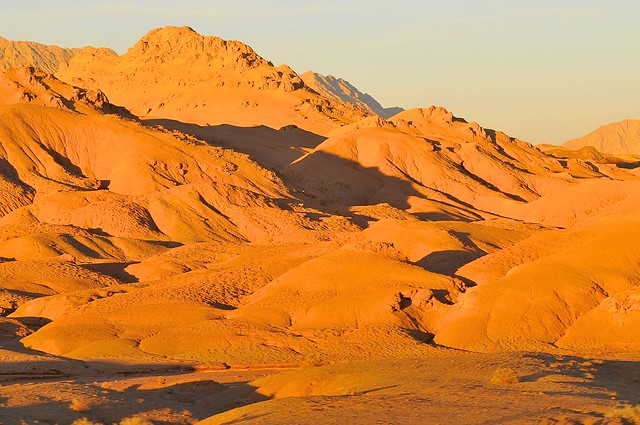 |
| Most of Iran may be desert, but that doesn't mean it's the boring empty expanses you see in the Taklamakan or the Karakum deserts. |
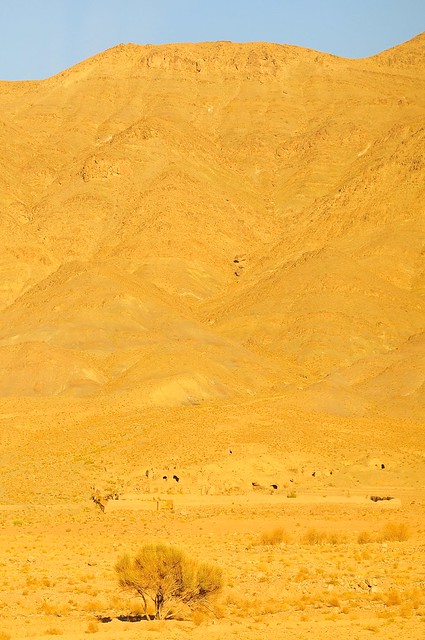 |
| What looks to be an old ruined caravanserai—or possibly a collection of mausoleums—at the foot of a mountain. |
As a result of me taking so many pictures, one of the locals on the bus realized I was a foreigner, and although he spoke almost no English, he came to talk with me (with the help of his dictionary on his phone). Like many in Iran, he was curious as to what westerners thought of Iran, and wondered why the west wanted to punish Iran with sanctions. I told him that the west was afraid that Iran was developing nuclear weapons. He didn't think they were, but he also said that Iran had the right to have a nuclear program, especially from an energy perspective but also from a weapons perspective. After all, he pointed out, India and Pakistan have them, as does Israel. So why does the west insist that Iran cannot have them? I said that the west was afraid that Iran would actually use them, especially since Ahmadinejad had said that Israel should be wiped off the map. I was surprised when he admitted that he had said that, but said that this wasn't really a legitimate threat. Despite the linguistic limitations, this was an interesting conversation, and think it illuminates something that is basically universal about Iranians: they have no problem separating political systems from the people. Maybe it's because so many Iranians feel that the government doesn't represent them or their interests, but you very much get the sense in Iran that everyone loves westerners (and Americans most of all) even if they deeply dislike many things western governments do. This contrasts sharply with the west, as I was honestly pretty shocked to be "warned" by people I know that I shouldn't go to Iran, as the people there would take me hostage or attack me or whatever. Of course this will seem absurd to just about everyone who has ever been to Iran, as the actual people there are very different than their government.
Budget
November 15, from Mary to Sarakhs to Mashhad: + $5 + 330,000 rial
- Samsa x 3: 2 manat
- Taxi from Mary to Sarakhs: 17 manat
- Shuttle bus across no-man's land: $2
- Taxi from Serakhs to Mashhad $3
- Bed ($6), dinner ($3), and internet ($2) at Vali's: 330,000 rial
November 16: 430,000 rial + $30
- Lonely Planet Iran: $30
- Bread: 5,000 rial
- Milkshake & cake: 45,000 rial
- Sandwich & cola: 25,000 rial
- Coke, chips, and bread: 25,000 rial
- Bed ($6), dinner ($3), and internet ($2) at Vali's: 330,000 rial
November 17, from Mashhad to Kerman: 568,000 rial
- VIP night bus to Kerman: 352,000 rial
- Chips: 8,000 rial
- Chips + rice packet: 38,000 rial
- Cheese puffs + bread: 25,000 rial
- Camping gas: 50,000 rial
- Cough Syrup: 70,000 rial
- Taxi to bus station: 15,000 rial
- Samsa: 10,000 rial
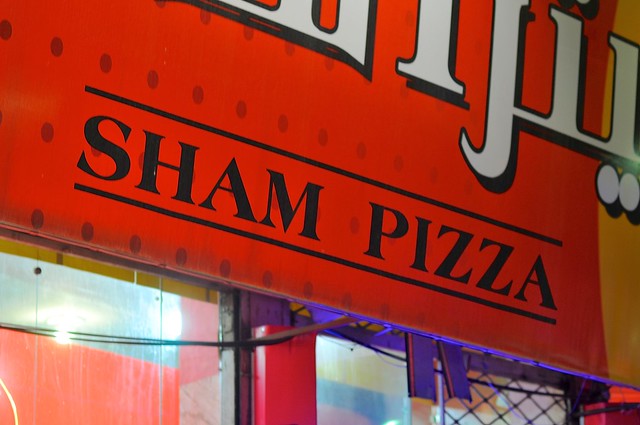
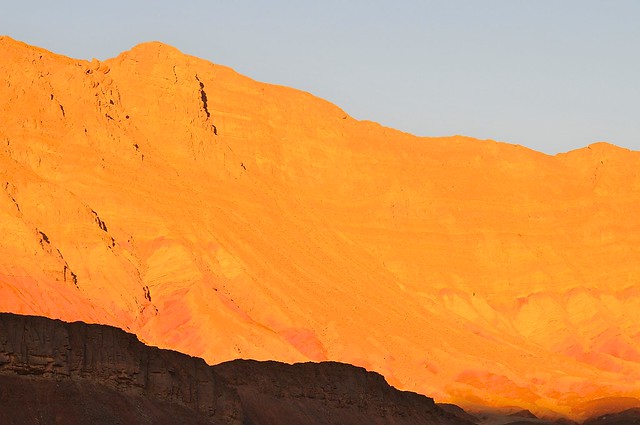
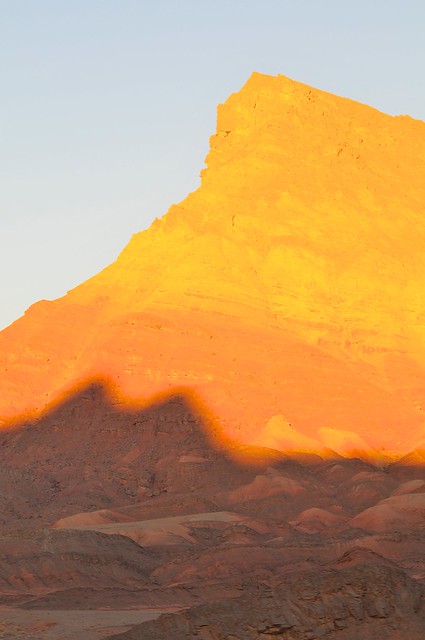
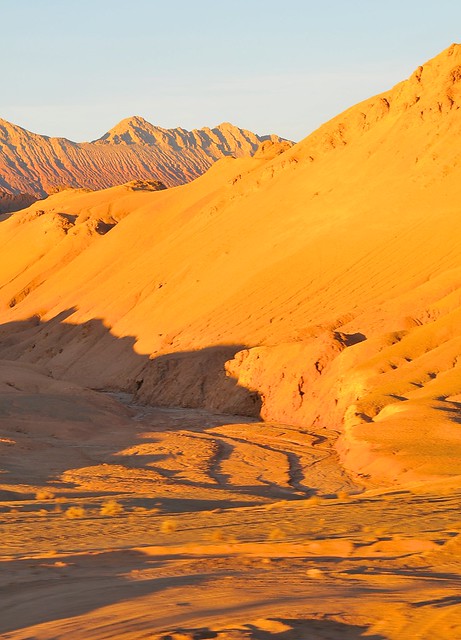
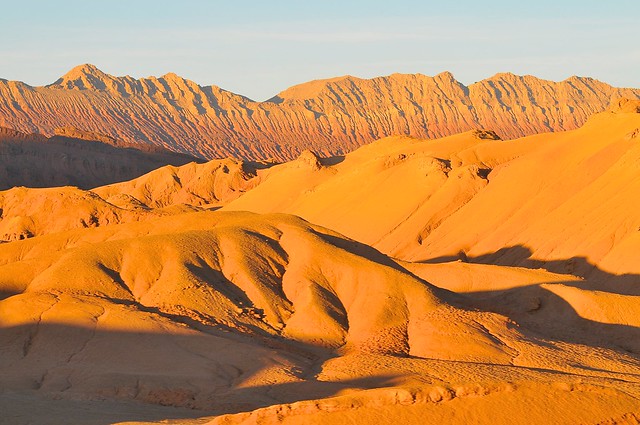
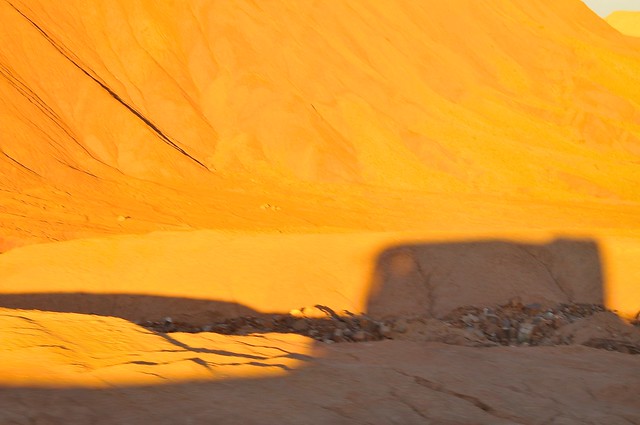
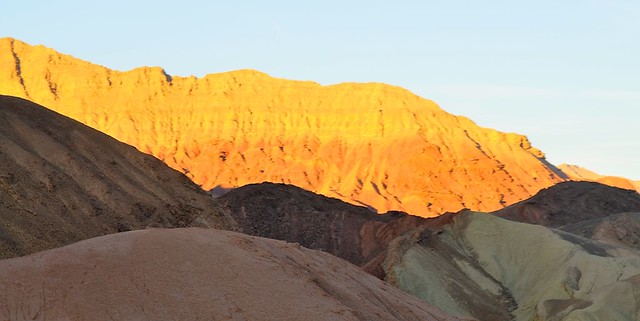
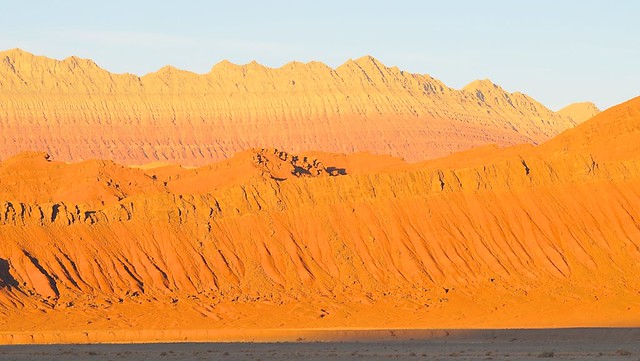
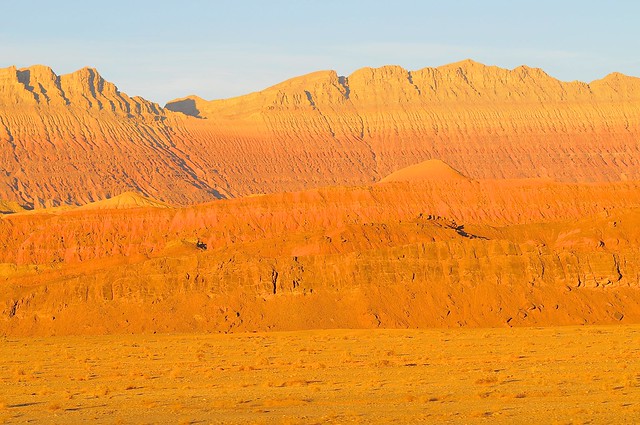
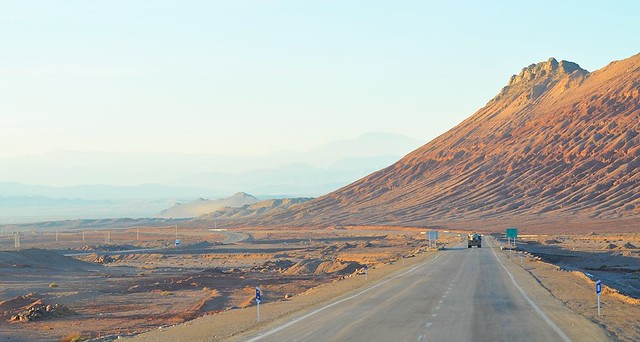
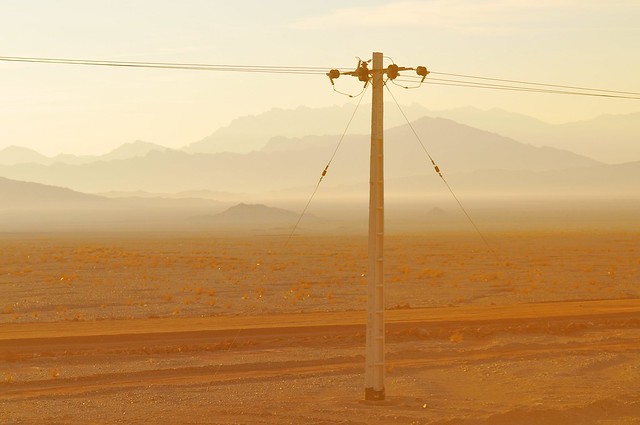
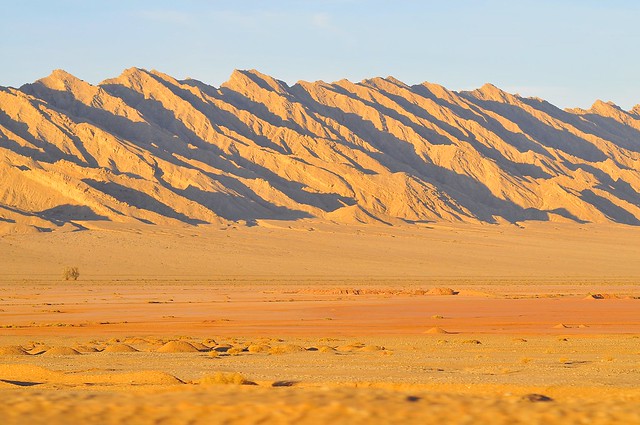

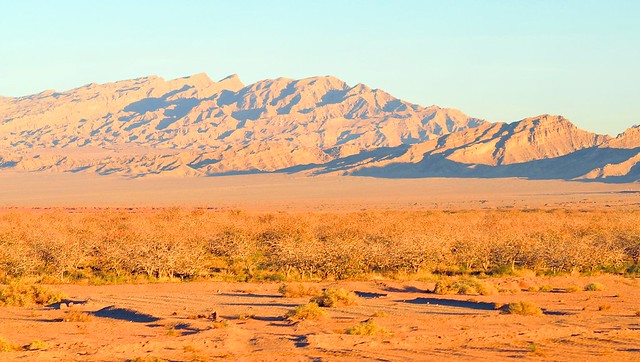
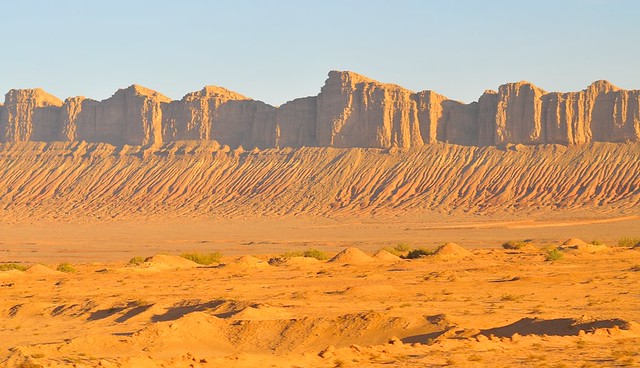
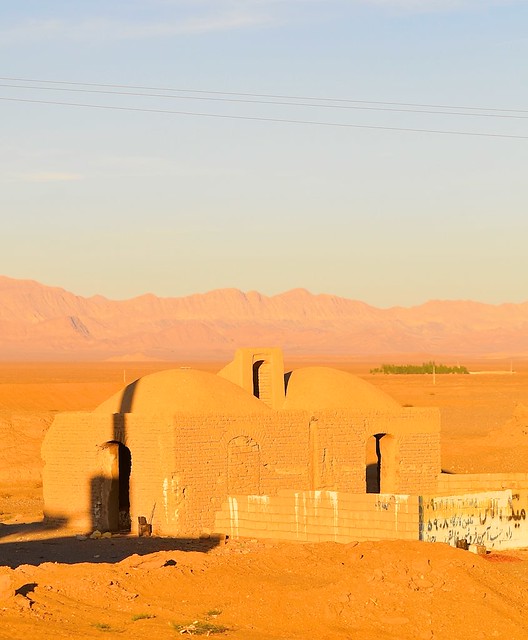
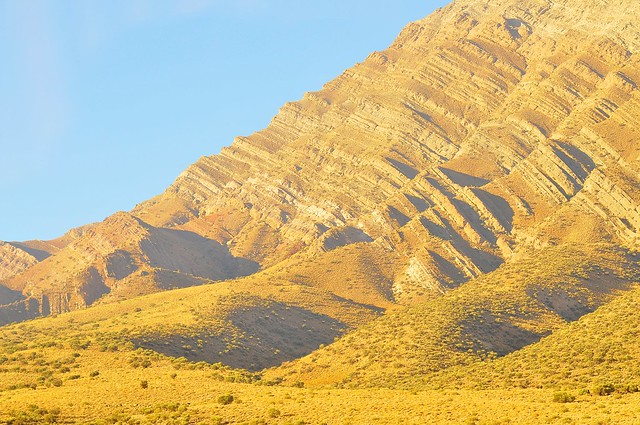
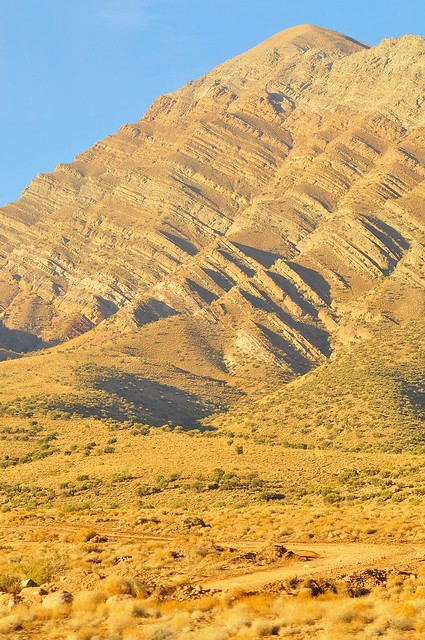
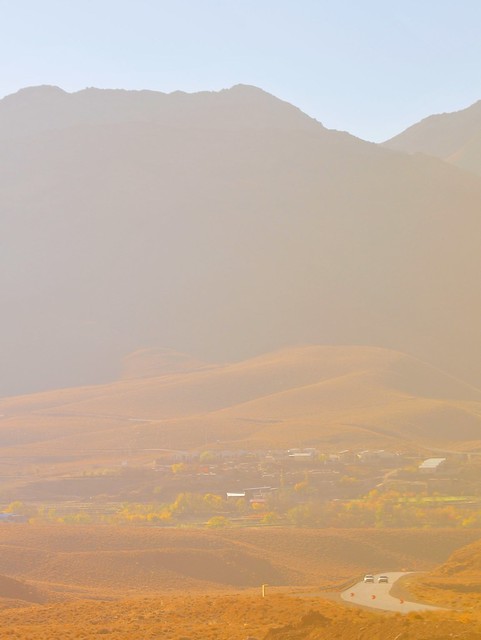
No comments:
Post a Comment